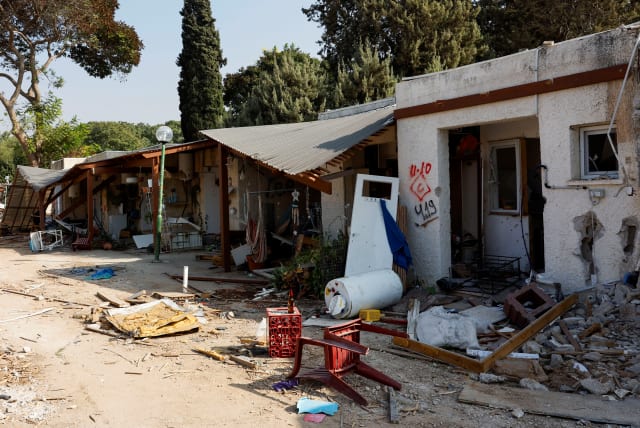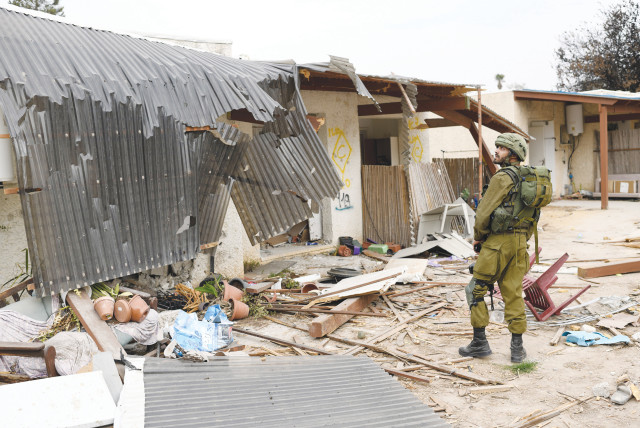October 7 devastated Israel, but philanthropy can help heal it - opinion

A long and difficult road must be taken to heal the shattered lives of the October 7 massacre survivors and to address their social, emotional, economic, healthcare, and community needs.
In the days and months following October 7, civic societies in Israel have again proven their significant power in the extreme realities of war and crisis. The civic organizations’ familiarity with the territory, coupled with their trailblazing entrepreneurial nature and connections to the community, culminated in an immediate call to action.
They responded quickly and accurately to the dire needs of civilians and military forces alike. One dreads to imagine how much worse the situation would have been without these organizations, which are backed by generous philanthropists, private donors, and a record number of volunteers who stood firm within hours of the catastrophe.
Now we are beginning to grasp the long-term challenges facing Israeli society. The displaced southern communities will not be able to return to their homes for perhaps years to come. A long and difficult road must be taken to heal the shattered lives of the October 7 massacre survivors and to address their social, emotional, economic, healthcare, and community needs.
The displaced northern communities were evacuated under different circumstances. Still, they too will endure hardships when they return to their homes and routines. All these families are currently living in temporary arrangements. Thousands of children have been removed from their educational environments; their parents remain without work, income, or foreseeable solutions. This reality is about to send secondary shock waves across the country.
Philanthropy, not charity, is what Israel needs to heal
Philanthropy can step in right now and play a key role in the healing of our society. To do so, donors must first distinguish between their heartfelt need to give charity for quick fixes and their ability to provide a strong and sophisticated infrastructure to ensure the regeneration of the injured communities.
The natural tendency to give charity to those who have lost so much is commendable. Many will continue to donate privately, participate in crowdfunding, and volunteer to address all the basic necessities. These efforts bring us closer together and boost our individual and social health.
However, philanthropy has a miracle-making advantage. It can produce long-lasting effects by rebuilding the educational, healthcare, and economic domains of the communities that were so severely damaged. It can define long-term goals and identify the professionals and civic organizations that can carry out strategies independently of short-sighted political influences.
Philanthropy can advocate for dialogue between NGOs that have gained experience and understanding of the needs and concerns of communities. Philanthropic investments can also give government officials precious time to think, reorganize, and learn from the experience gained by civic activity during the crisis.
In this historic moment, philanthropy can build bridges between experienced and highly knowledgeable civic organizations and government officials who have the obligation and authority to create sustainable policy in Israel.
The Jewish term for charity, tzedakah, represents our shared culture of social responsibility. These times call for tzedakah – charity giving for urgent needs – alongside philanthropy for long-term healing.
The writer is a board member of 121, an NGO for social change, and the former CEO of the Bracha Foundation and chairwoman of the Forum of Foundations.
Jerusalem Post Store
`; document.getElementById("linkPremium").innerHTML = cont; var divWithLink = document.getElementById("premium-link"); if (divWithLink !== null && divWithLink !== 'undefined') { divWithLink.style.border = "solid 1px #cb0f3e"; divWithLink.style.textAlign = "center"; divWithLink.style.marginBottom = "15px"; divWithLink.style.marginTop = "15px"; divWithLink.style.width = "100%"; divWithLink.style.backgroundColor = "#122952"; divWithLink.style.color = "#ffffff"; divWithLink.style.lineHeight = "1.5"; } } (function (v, i) { });

